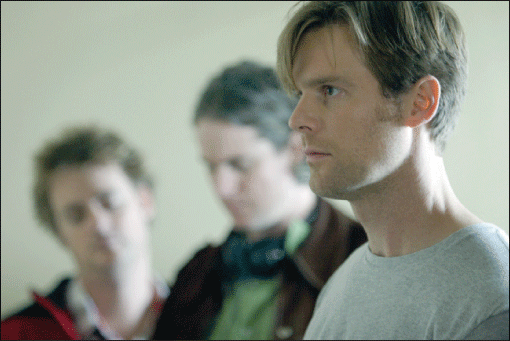By Steven Snyder
In ‘Civic Duty,’ a man’s curiosity turns creepy
While some have cited Hitchcock’s “Rear Window” in discussing “Civic Duty,” adding this to the recent list of such “Window”-inspired titles as “Red Road” and “Disturbia,” “Civic Duty” really has very few similarities to that great thriller of old. Unlike Jimmy Stewart’s quietly suspicious peeping tom, looking out from seclusion, Terry (Peter Krause) is a man who lunges outside his apartment, all but screaming about his fears and proclaiming that terror has moved in next door.
We first meet him at the bank, cashing his severance check, taking out his anger on an unsuspecting teller whom he deems too impersonal for his liking. He arrives home, informs his wife (Kari Matchett, from this season’s “24”) that he’s been laid off, and sets to typing out new resumes, cover letters and taking casual note of a pesky neighbor across the courtyard who he’s never noticed before — a neighbor awake and rummaging about at all hours of the night.
At first, his fascination with his neighbor is born out of sheer boredom. But the worse his job search goes — his formulaic cover letters never achieve their desired effect — the more his attention drifts to the window, and the goings-on across the way. Leaving the apartment complex one day, he finds himself hopping into his car at the same time as his mysterious neighbor (Khaled Abol Naga), and after seeing this stranger face to face (or rather, face to rearview mirror) and realizing he has the same skin color of the “most wanted terrorists” poster he saw the day before in the post office, Terry’s benign curiosity takes a turn into something more active and angry.
As they pull out onto the city streets, Terry starts to tail his neighbor, and after he witnesses a few suspicious acts, he calls the local FBI office. In a matter of days, he has committed himself to this investigation around the clock, despite warnings from his wife, and even the authorities, that his fear is ungrounded and that this investigation is crossing the line into obsession.
As played by Peter Krause, an actor best known for his impressive work in Alan Ball’s HBO series “Six Feet Under,” Terry is less a ticking timer than a bomb that has already gone off. He is unbalanced and anxious, raging and violent, and the more he listens to the news of a terror alert, the more he directs all his energy toward protecting his country and confronting the enemy within.
Now no doubt those involved with this project thought they were proving an important point, taking the Bush doctrine to its natural extreme and creating in Terry the idealized, militaristic neo-conservative who believes that in this post-9/11 world, enemies are everywhere, suspicious activity demands investigation and any use of force is justifiable if there’s a one percent chance it will protect us from terrorists.
But while there is surely a need for a work that ponders just how far our current strategies and philosophies might mislead us if they remain unchecked, “Civic Duty” is not the movie to fit the bill. Even amid a film like this that presents itself as an unmitigated attack on today’s far-right extremism, there must be some room for dissenting opinion, some serious consideration that perhaps torture, preemptive strikes and a pervasive surveillance state might indeed be the answers to the problem.
Yet here, everything is skewered to such an extreme that “Civic Duty” verges on the absurd, and the propagandistic. Krause, a delightfully warm and subtle screen persona, is reduced here to fits of growling and screaming as the story builds to the same angry crescendo again and again. And director Jeff Renfroe is perhaps the film’s greatest liability. Using many of the same heavy-handed techniques that one might expect to see in a documentary’s re-enactment scenes — the same rushed editing, slow-motion tracking shots and unfocused point of view — almost every single moment in “Civic Duty” is drowning in a hyper-serious state of brooding suspicion.
For a film like this to work, we need a sense of distance, where we can weigh the intuition of our supposed hero against the more rational ways of the outside world. From the very beginning of “Civic Duty,” we are thrown by Terry’s side and play witness to his freefall. Yet this proximity, when not presented with any sort of counterpoint, is not so much suspenseful as it is exploitive: “Come quick,” this film seems to say with glee, “the freak’s about to have a meltdown.”





























